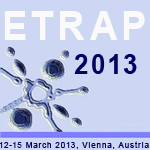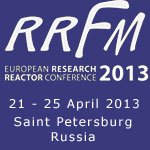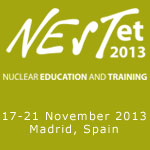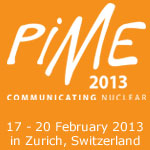
A Report on the state of research in France into radioactive waste management
For the 6th consecutive year the French CNE (see below) has issued its report on the R&D related to radioactive waste that is being carried out by Andra, CEA and others. It has also issued an ‘Opinion on the management of radioactive materials and waste,’ in answer to a request from the French parliament. ENS NEWS received from Frank Deconinck, Professor of Biomedical Physics at the Vrije Universiteit Brussel (Free University of Brussels) and
Chairman of the Board of the Belgian Nuclear Research Centre (SCK•CEN), the following English translation of the opening paper of this report. The English version of the full report will be posted on the web shortly (www.cne2.fr/).
(Editor-in-Chief)
CNE2: An opinion on the management of radioactive materials and waste
The nuclear industry produces long-lived radioactive substances. Some of these come in the form of waste. Ethics and sustainable development prohibit the industry from passing on the burden and responsibility for looking after this waste to future generations. Surface storage must only be a medium-term stopgap. Based on expert advice, the countries concerned have concluded that the solution that provides all the necessary safeguards is deep geological disposal. The Law of 2006 (the “Loi Bataille-Biraux”) adopted this method for the management of French waste, in conjunction with a reversibility clause for a period of at least a century. Other forms of waste, including plutonium and depleted uranium, can be used as resources for a new generation of reactors. These must first be made more efficient and even safer. Their implementation would ensure France's independence, in terms of electricity production, for several centuries. The same Law of 2006 confirmed the mission given to CNE2, namely to annually submit to Parliament a report and an opinion on the progress and quality of the studies, research and developments carried out in the fields of deep geological waste disposal and on the transmutation of radioactive materials by means of Generation IV reactors.
Drawing on more than twenty years of experience gained through listening to those concerned and to carrying out assessments of the facilities and laboratories that contribute to this initiative - both in France and abroad - CNE2 believes it is justified in saying today that:
1. The glass packages and clay in deep geological repositories are effective barriers for containing fission products and actinides for hundreds of thousands of years. This provides enough time to reduce their harmfulness to a level where it no longer poses a problem for people living above the disposal facility.
2. The Meuse/Haute-Marne geological site was selected for detailed studies because it offers a clay layer of over 130 metres thick and 500 metres deep that has demonstrated excellent containment qualities: stability for at least 100 million years, very slow water circulation and a high holding-capacity of radionuclides.
3. The design of the structure that is to be built - shafts, tunnels, cavities, ventilation, seals etc. - and the development of the methods and procedures necessary for guaranteeing safety during its operation and after final closure, are currently being studied. They are sufficiently advanced to enter the industrial phase, in accordance with the law. This is a specific implementation project, with all the necessary development, innovation and engineering steps having been taken. It must be carefully monitored. The review in 2015 of the application for authorisation to create the disposal facility will be an important milestone in this monitoring process.
4. The plutonium produced in the fuel cycle is a dangerous substance, but it may also become a valuable resource if used in fast neutron reactors. These reactors have the added benefit of consuming depleted uranium, for which there is currently no use, which would relieve the heavy burden on mining and enrichment. Moreover, they could potentially be used to transmute minor actinides into shorter lived isotopes. Research and development dedicated to fast neutron reactors has already validated their scientific and technical feasibility. In order to test their industrial and economic viability an experimental reactor and its corresponding cycle - fuel fabrication and reprocessing - are essential. Its implementation, under the Law of 2006, preserves a range of energy choices, strengthens French expertise in the civil nuclear industry and ensures that France and Europe are competitive on the world stage.
CNE2 was formed to carry out an annual assessment of the progress made in research on the management of radioactive materials and waste. This assessment results in an annual report submitted to the Parliamentary Office for the Evaluation of Scientific and Technological Choices (OPECST). Besides the French research that is assessed in relation to the guidelines established by the National Plan for the management of radioactive materials and waste (PNGMDR), the report also looks at research conducted abroad. Since its creation in 2006, the CNE2 Board has produced six annual reports, the most recent of which has just been published. The CNE2 Board was formed by the aforementioned Law of 28 June 2006, the so-called 'Bataille-Biraux' Law, which lays down the provisions established in France for the management of radioactive waste.
The CNE2 Board has twelve members, chosen based on recommendations from the Académie des Sciences, the Académie des Sciences Morales et Politiques and the OPECST. For its evaluation work, the CNE2 Board is totally independent and conducts hearings of the organisations that perform research into the management of radioactive materials and waste. A dozen or so day-long hearings are held each year. In order to encourage scientific discussion related to this work, which is by nature multidisciplinary, each hearing is attended by the stakeholders involved. The most important of these are Andra, which coordinates research into reversible geological disposal and storage, and CEA, which coordinates the research that is carried out in partitioning & transmutation.
According to the law, these organisations must provide the CNE2 Board with any information that it deems necessary.
|





